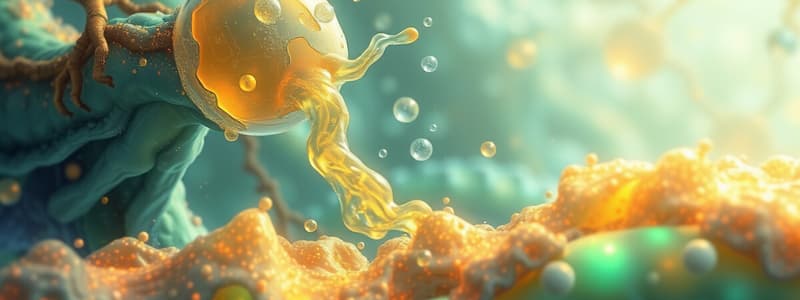Podcast
Questions and Answers
What is the function of amylase?
What is the function of amylase?
Break down starches.
What effect does pH have on amylase?
What effect does pH have on amylase?
Too low or too high causes the enzyme to stop working; denature amylase.
What effect do bacteria have on cellulose?
What effect do bacteria have on cellulose?
Cellulose cannot be digested without cellulase.
What is the effect of amylase on cellulose?
What is the effect of amylase on cellulose?
What is pepsin?
What is pepsin?
What is the function of pepsin?
What is the function of pepsin?
What is the effect of pH on pepsin?
What is the effect of pH on pepsin?
What is the function of lipase?
What is the function of lipase?
What is the function of bile salts?
What is the function of bile salts?
What is the effect of pH on lipase and bile salts?
What is the effect of pH on lipase and bile salts?
Flashcards are hidden until you start studying
Study Notes
Amylase
- Amylase functions to break down starches into simpler sugars.
- Optimal pH for amylase activity is critical; extreme pH levels cause denaturation and loss of function.
Cellulase and Cellulose
- Cellulose requires cellulase for digestion; animals like ruminants cannot produce cellulase.
- Symbiotic bacteria enable these animals to digest cellulose by synthesizing cellulase.
Amylase and Cellulose
- Amylase has no effect on cellulose as it targets 1-4 alpha glucose links, while cellulose has 1-4 beta links.
- Despite both being glucose polymers, only starch is digestible by amylase.
Pepsin
- Pepsin is a digestive enzyme derived from pepsinogen, activated by hydrochloric acid in the stomach.
- Once activated, pepsin breaks down proteins into polypeptides, not fully into amino acids.
pH and Pepsin Function
- Optimal pH for pepsin is between 1.5 and 2.0, with activity diminishing past pH 4.0 due to denaturation.
- Pepsin can undergo autolysis at higher pH levels; storing at pH 11.0 causes loss of activity.
Lipase
- Lipase enzymes break down lipids into glycerol and fatty acids, facilitating lipid digestion.
Bile Salts
- Bile salts, produced in the liver, emulsify fats into smaller globules, enhancing lipid digestion.
- They also play a role in maintaining an alkaline environment necessary for effective lipid digestion through hydrolysis.
Bile Salts and pH
- More bile salts lead to a higher starting pH, while less bile results in lower pH levels.
- Bile salts act as buffers; increased amounts stabilize alkaline pH, while less bile permits easier pH drops.
- Increased bile leads to smaller oil droplets, enhancing breakdown and consequently lowering pH.
Studying That Suits You
Use AI to generate personalized quizzes and flashcards to suit your learning preferences.




